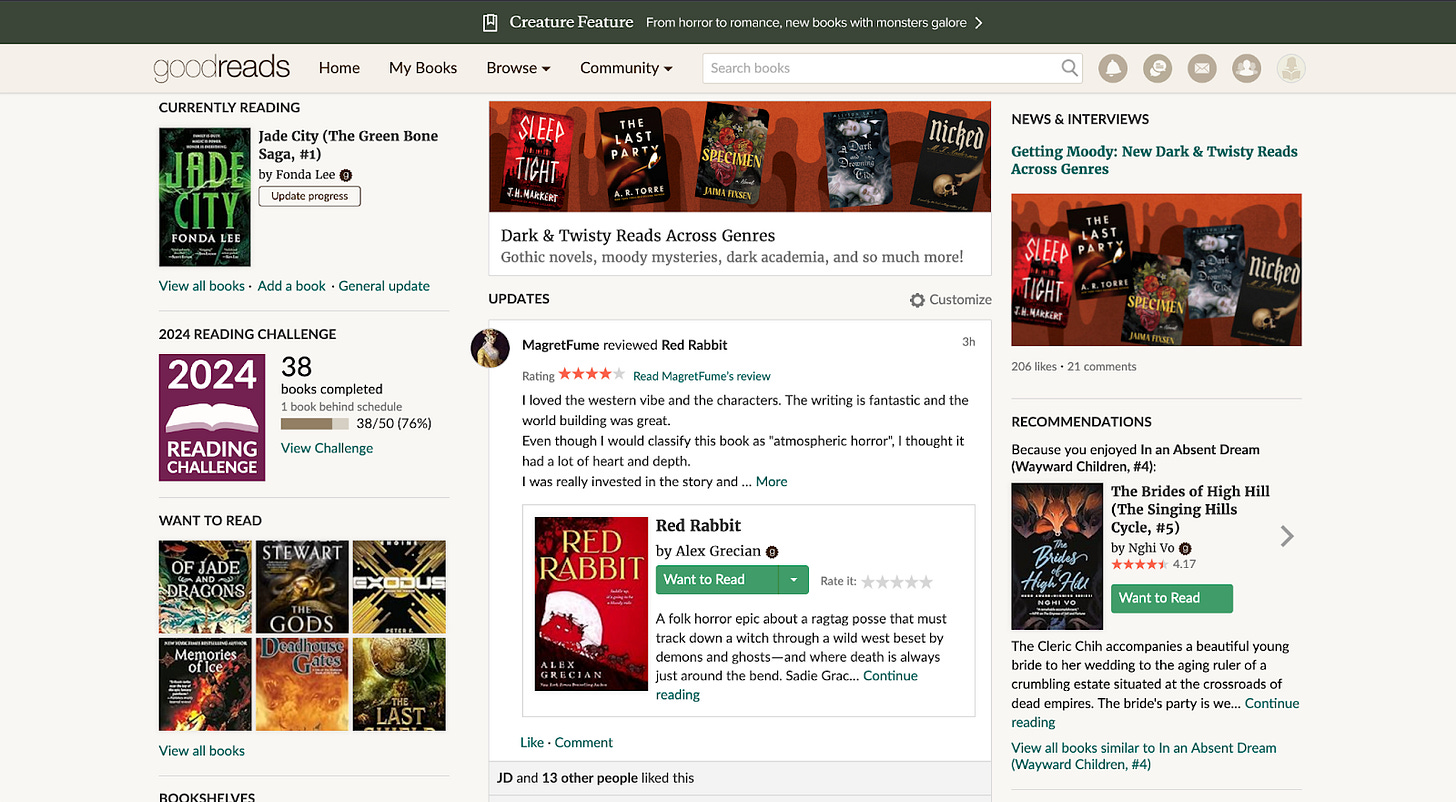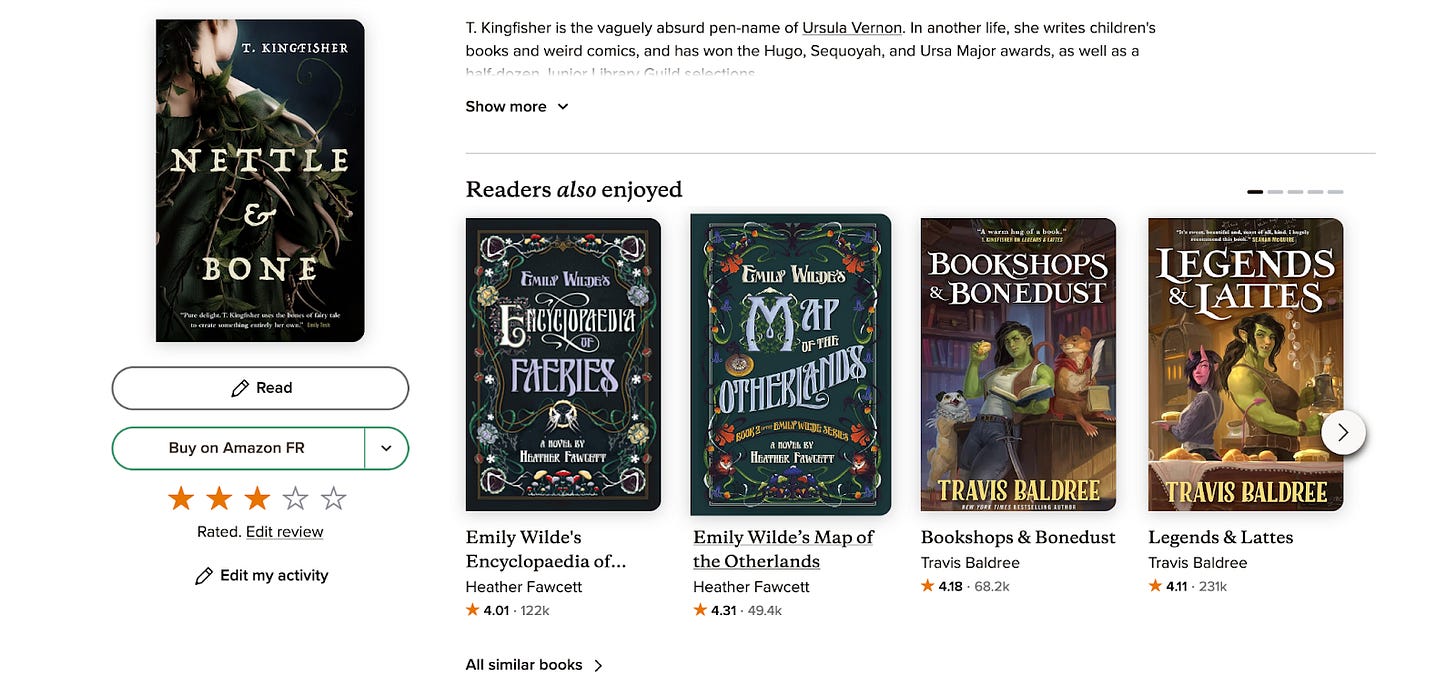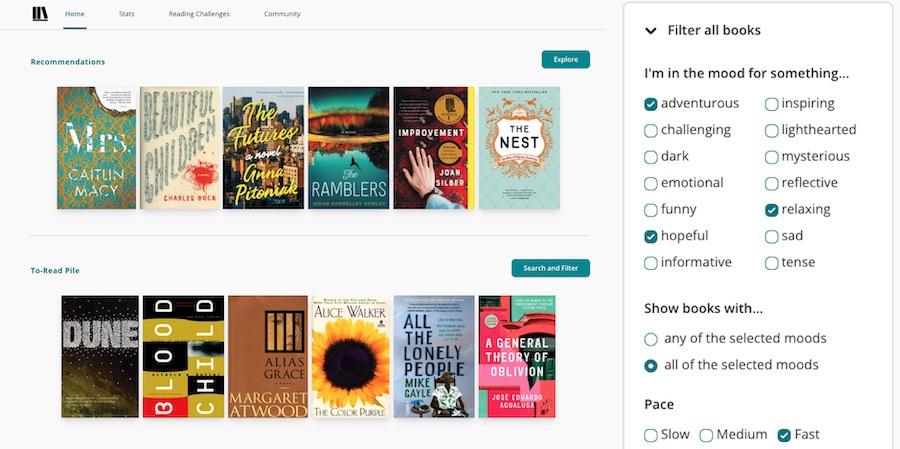Escaping Goodreads' Gravity Well
A manifesto against Goodreads’ galaxy-wide attraction, and a call for new astronauts to join me in colonizing The Storygraph instead.
It’s 2024, and Goodreads is a dying planet— its atmosphere stale, the infrastructure outdated, and the gravity so strong that it’s hard to leave. You’d think by now Goodreads would have either evolved or been replaced by something sleeker, faster, and more modern. But here we are, still slogging through its clunky user interfaces, suffering under the weight of its mediocre recommendation system, and wandering through a wasteland of contradictory reviews. Yet, despite all its flaws, Goodreads continues to dominate the book universe, holding its users in orbit.
Do not despair! I am your captain and together we’re going to take off to a better literary destination. But first, let me put my recruiting hat on and convince you to come on this journey with me…

Can you leave the only planet you know?
Goodreads is massive, and in the world of online platforms, mass equals gravity. Once you’ve been pulled in, it takes serious effort to break free from its orbit. After all, you wouldn’t want to lose years of book logging, your curated bookshelves, and thousands of ratings, would you?
But there’s more at work here than just inertia. Goodreads is a prime example of a gravity well, where the sheer weight of its userbase keeps people anchored, despite better alternatives existing just beyond the horizon.
Think of it as living on a planet that’s well past its prime: the buildings are crumbling, but they’re still standing and you can find all the books you need. The air is thin, but you’ve learned to breathe it and navigate the toxic review page. It’s not the best place to be, but you’ve been here since you first logged in on the interwebs, and so are all your friends. Goodreads has been around long enough that its flaws have become part of its identity. It’s safe and familiar, and more importantly it’s home.
What if you can’t rate books by the half star? Everyone knows that you can indicate your true rating in the review’s body anyways! And what need is there for a mobile app? We’ve always used the computer, we can do without (insert rant about how dependent we are on smartphones)! It’s perfectly fine if it takes 10 seconds to load a page, you needed the break anyways.

Goodreads’ longevity isn’t about it being the best— it’s about network effects. With over 125 million users, the site has an enormous gravitational pull: the more people that use it and rate books, the more valuable it becomes, creating a self-sustaining cycle that keeps users coming back. It’s where all your friends are, where you find endless streams of reviews, and where every book you’re interested in has already been discussed to death.
And unless we’re ready to muster the energy to escape this overwhelming mass of content, we’ll keep orbiting this little old planet, logging in and sighing as we navigate its tired old terrain.
Where do you go when the sky is not the limit?
Let’s avoid the technical details for now and pretend your spaceship is ready to go. What should you aim for?
The brightest star right now is The Storygraph. The air is fresh, the infrastructure solid, and the entire planet was built to be more functional and intuitive.
The Storygraph has everything you need to thrive: sleek design, fast loading times, ratings that allow half-stars, detailed review templates (that you can ignore if you hate them), and even trigger warnings for sensitive topics. And, oh yeah, there’s a mobile app that actually works.
The recommendation engine works a lot better and shows me books i’m actually interested in. I love the search filters that allow you to select books based on length, pace, or even mood! The tags are user-generated, so you can add your own when you review a book. It’s not perfect, but it is a thousand times more useful than Goodreads’!

Even better, The Storygraph is made by a small independant team! While the site is completely free to use (none of the features are paywalled), paying members have a direct line of support to ask for feature requests - and they truly get answered. On top of that, there are no ads, no “best books of the summer” listicles that publishers paid for,… Goodreads on the other hand is owned by Amazon and tries to send you to their website as often as possible. It also absolutely sells every single byte of data you give it!
Ready for takeoff: Goodreads has already packed your bags
Now that we’ve decided where to go, it’s time to figure out the fine print. Escape is possible,but it takes a bit of effort - although not as much as you would think!
Thankfully for you refugees, Goodreads makes it decently easy to pack your suitcase. Hidden in your profile, deep inside the engine room, you’ll find a shady “Danger, don’t touch” button to export all of your data (scroll to the bottom, it’s not that far i promise!). Don’t bother opening that file, the format is atrocious!
But your destination should have an import function to help you get settled. On The Storygraph it works splendidly! Their English catalogue is similar enough that the data translates easily. If you read lots of indie publications or in another language, you might have to spend an hour adding the missing books, but The Storygraph’s input form makes this easy as floating in zero g!
Here be dragons black holes
The thing is, once you arrive on The Storygraph, you might feel like the first citizen on a terraformed Mars: the decoration is pristine, the vegetation lush, but it’s a bit... lonely. Despite what my antisocial tendencies tell me, reading is a social hobby. There are a few scientists who did all the work, but they all know each other and don’t really align with your tastes so you’re not sure how to strike up conversation.
The initial feeling might be disconcerting, but it’s only temporary. Whether you evangelise your friends or make new ones, you’ll soon find all the connections you need. The oxygen is there, we’re only missing a few extra brave explorers to make it enjoyable, so go tell your friends – or send them this article ;)
Can you bring yourself to trust our little community? I get it, Goodreads with its years of data and community-generated content feels reliable. Its machine-learning engines feed on ratings and reviews to offer you recommendations, which absolutely mirror the most popular reads in your demographic segment.
The Storygraph might offer faster tech, but the sheer volume of content on Goodreads gives you (and me!) a sense of security. On Storygraph, recommendations are more targeted, more refined, but with fewer reviews and ratings, the results can feel a little less certain, like you’re still mapping out the terrain.
But here’s the thing: if more people make the jump, this problem solves itself. Once the critical mass arrives, The Storygraph offers not only the superior interface but the rich, social experience Goodreads has always had - and it’s exponential! And in the meantime, you can always copy paste the title of the book into Goodreads if you need to – you’re not going into space after all, you’re just switching windows ;)
You will have to kiss your job goodbye though…
There’s another force keeping people anchored to Goodreads: the publishing industry is invested in the platform too. For bloggers, reviewers, and ARC (Advanced Reader Copies) seekers, Goodreads is more than a platform - it’s a currency. It’s where publishers go to measure influence, check review counts, and see who’s active. Goodreads is part of the publishing ecosystem, so even though it’s on the decline, abandoning it means losing access to that world.
I know the pull that new releases and free books have on everyone - I was a broke student and until 2 weeks ago, ARCs have been the only way for me to access new releases as they come out!
The Storygraph hasn’t yet tapped into that system. But the tide is changing, and if enough people make the move, it could become the new centre of gravity for publishers too. Once again, for all my (somewhat dodgy) metaphors, I’m not asking you to delete your Goodreads account. You can always double post reviews for those pesky marketers and have the best of both worlds!
Let’s start this engine!
We’re not just talking about switching platforms; we’re talking about overcoming the inertia that keeps people tied to the past. Goodreads is like a planet in decay, and escaping it means launching yourself into a new, more promising orbit. It’s not easy, but it’s not that hard either! And the rewards are worth it: if you’re tired of Goodreads’ web 1.0 design and janky buttons, it’s time to start thinking about your escape plan. I volunteer to be your navigator so ask me any questions in the comments or by replying to this email!
And if you’re already convinced that The Storygraph is the better planet to call home, start pulling your friends out of Goodreads’ influence too - because once enough of us break free, the sky’s no longer the limit!

And if you want to connect, here is my profile. Currently it’s a bit empty — for all my talk of transitioning over, i kinda want to be a professional adultTM and i didn’t transfer my old reviews (no, you don’t need to know how many stars i gave Twilight when i was 11 years old). I will maybe copy over some stuff as i go, but more probably i’ll just add to it as i read new books!
Let me know your username in the comments (or by replying to this email) so we can be friends <3





I'm in. There's something so untrustable about an algorithm that has been feeding for a decade--like it has only gotten better at monetizing me, not at actually recommending what I would read. This is long overdue. Thank you for the clear path.
You have converted me.